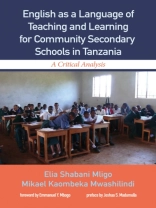This book examines the challenges posed by English, a foreign language, as a language of teaching and learning for community secondary schools in Tanzania in terms of academic performance. The book probes the necessity for having two languages of instruction in the Tanzanian educational system. While Kiswahili, the native language, is predominantly understood by the majority of people, the discussion in this book indicates that most students in community secondary schools in Tanzania are incompetent in understanding, writing, listening, reading, and speaking English, a language they use in learning and doing their examinations, especially in the early stages of their secondary studies. The incompetence in the above-mentioned skills is mostly caused by their inability to cope with the abrupt transition in the languages of instruction from their pre-primary and primary school study [Kiswahili] to secondary school study [English]. Moreover, most teachers are unable to use the English language as a means to impart knowledge or facilitate learning to their students, leading them to code-switching and code-mixing. This book poses a challenge to countries whose students pass through a transition from one language of instruction to another in their educational systems, helping them to make appropriate decisions in regard to the appropriate language of teaching and learning.
Об авторе
Mikael Kaombeka Mwashilindi is Assistant Lecturer at Tumaini University Makumira, Mbeya Centre in Tanzania.












